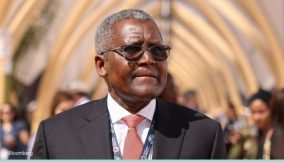Digital infrastructure gap is threatening Nigeria’s aspiration to become a powerhouse in Artificial Intelligence (AI) on the continent.
In April 2024, Nigeria assembled 120 stakeholders to draft a National AI Strategy to keep pace with the ongoing AI revolution. However, the draft document of this strategy highlights how the country’s agelong infrastructural deficit could hinder its AI aspirations.
The document shows that lack of reliable internet connectivity, robust data centers and accessible cloud computing services are barriers to AI development and deployment.
Read also: Leveraging Artificial Intelligence for optimal performance by Nigerian banks
Despite having nine submarine cables delivering internet capacity to its shores, Nigeria faces a 90,000-kilometer fiber infrastructure gap, resulting in slow and unreliable internet access.
“Nigeria aspires to be a global leader in AI, but achieving this vision requires a foundational infrastructure for AI and other emerging technologies,” the stakeholders said.
“This pillar addresses building affordable and localised infrastructure foundations and the compute capacity to support the thriving AI ecosystem in Nigeria.”
The document further highlights that the current AI era demands modern data centres equipped with accelerated computing, data, and model stacks — resources the country currently lacks. The country, through Airtel Africa, is only now beginning to build its first hyper-scale data center, with the stakeholders noting that existing data centers need to be upgraded and scaled to meet the demands of AI research and use.
Nigeria ranks 11th and 140th on mobile and fixed broadband globally. According to the Portulans Institute’s Network Readiness Index, Nigeria’s score is put at 35.73, ranking 106 out of 134 economies. On Oxford Insights’ AI Infrastructure Index, Nigeria scores just 42.67.
The International Monetary Fund (IMF) describes AI as a “technological revolution that could jumpstart productivity, boost global growth, and raise incomes around the world.” By 2030, AI is expected to add $2.9 trillion to Africa’s Gross Domestic Product (GDP), and Nigeria’s AI market is projected to reach $434.4 million by 2026.
Bosun Tijani, minister of Communications, Innovation, and Digital Economy, recently emphasised, “There will be a convergence of AI systems, so Nigeria should be part of that global superpower in the development and regulation of AI.”
To address these gaps, the draft National AI strategy recommends establishing national High-Performance Computing (HPC), investment in AI-specific hardware and software development, setting up of clean energy AI clusters to reduce dependence on the national grid, and offering of tax breaks and other incentives to encourage investment in critical AI infrastructure.
Beyond infrastructure, the document highlights the need for a robust and vibrant ecosystem of partners, collaborators, academia, and a highly skilled workforce to support Nigeria’s AI ambitions.
Nigeria is already making strides to address some of the identified gaps. During the AI workshop that heralded the AI strategy, Tijani had announced several initiatives, including the relaunch of the National Centre for Al and Robotics (NCAIR) to promote research and development on emerging technologies.
Read also: The Role of Artificial Intelligence in the growth of Insurance Industry in Nigeria
Also, the Ministry of Communications wants to deploy 90,000 kilometers of fiber across the country within the next two to three years.
“To ensure progress towards building the infrastructure needed for a robust digital economy in Nigeria, we understand that quality access is the backbone of a digital economy and have, therefore, focused on connectivity,” Tijani said in an interview with BusinessDay.
The project, estimated to cost $2 billion, will be executed in collaboration with development finance institutions such as the World Bank and the African Development Bank (AfDB).
However, some Nigerians have questioned whether the country is prioritising the right areas with its AI push. Addressing these concerns recently, Olumide Balogun, director of Google West Africa, stated, “When people think about AI, they always think about robotics and very geeky and technical things. But think about what we are already doing with AI, things like flood forecasting in the North, where forecasts on flooding can get people out of harm’s way and give the government notice. Think about things like prenatal care, disease control, and food security and you will find they are very close to what we need to do now.”
Join BusinessDay whatsapp Channel, to stay up to date
Open In Whatsapp





